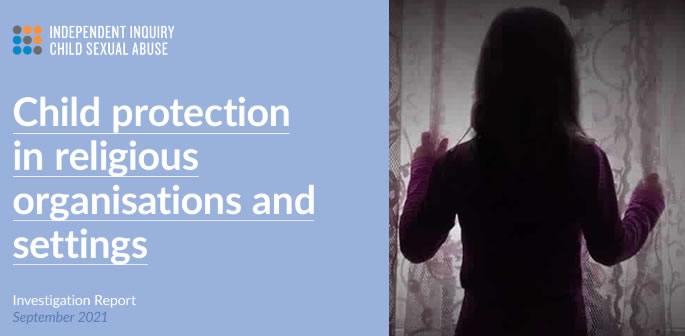"religious leaders could perpetrate abuse."
According to a report, the sexual abuse of children is prevalent in many religions, with some found to have no child protection policies in place.
The report was published by the Independent Inquiry into Child Sexual Abuse (IICSA).
It highlighted victim-blaming, a lack of discussion around sex and sexuality, abuse of power by religious leaders and discouraging external reporting.
The Child Protection In Religious Organisations And Settings report examined evidence from 38 religious organisations in England and Wales.
These include Jehovah’s Witnesses, Baptists, Methodists, Islam, Judaism, Sikhism, Hinduism, Buddhism, and non-conformist Christian denominations.
The report was based on 16 days of public hearings held during March, May and August 2020.
It said it was likely that there was a significant under-reporting of child sexual abuse in religious organisations and settings.
According to the report, what makes religious organisations different from other institutions is “the explicit purpose they have in teaching right from wrong; the moral turpitude of any failing by them in the prevention of, or response to, child sexual abuse is therefore heightened”.
There is “significant diversity” between religious organisations as to whether they have adequate child protection policies in place and the extent to which they effectively follow them.
The report stated: “Religious believers can find it difficult to accept that members of their congregation or religious leaders could perpetrate abuse.
“As a result, some consider that it is not necessary to have specific child protection procedures or to adhere strictly to them.”
There have been “egregious failings by a number of religious organisations” and cases of child sexual abuse perpetrated by their adherents.
One example in the report featured four people who were all sexually abused at the age of nine by a teacher in a mosque.
The report said that in 2017, the abuser was convicted and jailed for 13 years.
Another example was a 12-year-old girl who was sexually assaulted by a church volunteer.
She told her mother, who reported it to the police.
After being made aware, a church minister told her mother that the abuser was “valued” and must be considered “innocent until proven guilty”.
It was later revealed that the abuser was previously dismissed from the police following charges of unlawful sexual intercourse with a minor.
Approximately 250,000 children in England and Wales receive “supplementary schooling” or “out-of-school provision” from a faith organisation.
Because there is no requirement for them to be registered with any state body, they have no oversight in respect of child protection.
The report made two recommendations:
- All religious organisations should have a child protection policy and supporting procedures.
- The Government should legislate to amend the definition of full-time education to bring any setting that is the pupil’s primary place of education within the scope of a registered school.
The report also said Ofsted should have the power to examine the quality of child protection when inspecting suspected unregistered schools.
Professor Alexis Jay, chairwoman of the Inquiry said:
“Religious organisations are defined by their moral purpose of teaching right from wrong and protection of the innocent and the vulnerable.
“However when we heard about shocking failures to prevent and respond to child sexual abuse across almost all major religions, it became clear many are operating in direct conflict with this mission.
“Blaming the victims, fears of reputational damage and discouraging external reporting are some of the barriers victims and survivors face, as well as clear indicators of religious organisations prioritising their own reputations above all else.
“For many, these barriers have been too difficult to overcome.”
“We have seen some examples of good practice, and it is our hope that with the recommendations from this report, all religious organisations across England and Wales will improve what they do to fulfil their moral responsibility to protect children from sexual abuse.”
During the long-running inquiry, other investigation areas included Westminster and the internet.
The final report of findings from all 19 sections of the investigation will be presented to Parliament in the summer of 2022.






























































